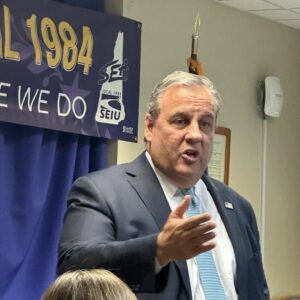It was a case of “deja vu all over again” for former New Jersey Gov. Chris Christie.
As a Republican governor in the heavily Democratic Garden State, Christie earned a reputation for his combative leadership style, getting in high-profile fights with leaders of public sector unions that often made the nightly news.
But in Concord on Thursday night, Christie faced a generally friendly audience at a town hall organized by the New Hampshire State Employees Association. According to SEA/SEIU president Rich Gulla, Christie is the first Republican presidential candidate to meet with his union’s membership since populist pioneer Pat Buchanan. During the 2020 Democratic primary, outspoken Hollywood progressive Susan Sarandon stood in the same room Christie appeared in, touting Sen. Bernie Sanders’ candidacy.

Former N.J. Gov. Chris Christie answers a question from a union member at a town hall hosted by the NH SEA/SEIU.
Gulla introduced Christie to about 50 members and thanked him for speaking to their group and supporting the First in the Nation primary. After the town hall, he told NHJournal he liked what he heard.
“The professionalism, civility and candor of our members, and the direct and honest answers from Gov. Christie were deeply appreciated by us. We look forward to continuing the conversation the New Hampshire way,” Gulla said.
For Christie, the event was another chance to cement his standing as the GOP primary candidate for voters who don’t often (or ever) vote in Republican primaries. As his campaign said in a press release after the town hall, “Christie has long advocated for Republicans to expand turnout by talking to people and going to places that Republicans historically avoid. It’s just part of the campaign’s strategic efforts to expand the turnout model in New Hampshire.”
For the union, it was another step in their outreach to Republicans, something the SEA hasn’t pursued in the past. But with a growing number of blue-collar workers voting with the GOP, Gulla and the union are attempting to embrace the change. For example, Gulla told NHJournal in a podcast interview two weeks ago the union plans to endorse candidates in both the Democratic and Republican primaries.
However, it is extremely unlikely the union, a longtime traditional ally of the Democratic Party, would endorse a Republican in the general election.
Christie was undeterred.
“You go back and talk to your [union] colleagues in New Jersey; I think they’ll tell you two things. ‘I didn’t always agree with him, but he always worked with us. And we fixed things.’ And that’s the same kind of approach I’m going to bring to Washington.”
Audience questions from the union members covered issues where unions traditionally have a direct interest. For example, the first was about Christie’s green energy plan and the role of union labor in its construction. The second was about the need to build more housing (presumably with union labor). Another member wanted to know how he would have handled the recent UAW strike, where former President Donald Trump appeared and President Joe Biden walked the picket line.
Christie largely stuck to his traditional Republican economics, saying on the UAW strike issue he didn’t see a role for a president of the United States “unless things get really bad.”
One odd moment came when Christie used the event to go after former U.N. Ambassador Nikki Haley on abortion.
Christie brought up the abortion debate in his opening remarks, telling the crowd he is personally pro-life but “I also believe you should have the right to make your own decisions” at the state level. “States should be deciding this for themselves. There are different opinions in New Hampshire than there are in Georgia.” Christie also won’t sign a federal six-week abortion ban.
And, Christie said, he thought Haley was with him on that.
“But a week ago, I saw her in Iowa sitting across from a guy named Bob Vanderplatt, who’s an evangelical leader. And he asked her, would you sign a six-week abortion ban? And she said ‘yes.’”
And I thought to myself, ‘Well, hell, man, I have seen her in New Hampshire any number of times, where she has said she doesn’t want to use this issue to divide America anymore. But when she’s in a place that’s much more conservative than here, with a guy that’s much more conservative, she tells the guy what he wants to hear.”
The Haley campaign noted she was answering a question about a state law she would have signed as governor, not a federal abortion law.





